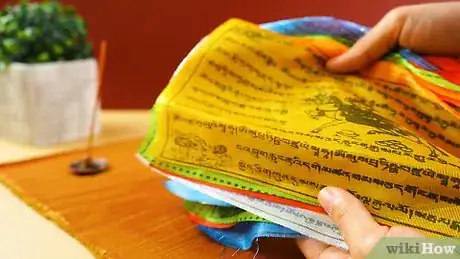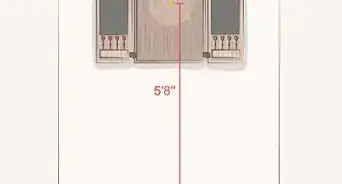This article was co-authored by wikiHow Staff. Our trained team of editors and researchers validate articles for accuracy and comprehensiveness. wikiHow's Content Management Team carefully monitors the work from our editorial staff to ensure that each article is backed by trusted research and meets our high quality standards.
There are 7 references cited in this article, which can be found at the bottom of the page.
The wikiHow Video Team also followed the article's instructions and verified that they work.
This article has been viewed 36,605 times.
Learn more...
Tibetan prayer flags are square pieces of cotton strung together on one rope. Each flag has a spiritual message printed on it that promotes peace, compassion, strength, and wisdom. The Tibetan people hang the flags outside as they believe the wind will carry those spiritual messages to the world, which in turn will bring compassion and goodwill to all living things. Hanging prayer flags is not limited to Buddhists; anyone is welcome to hang prayer flags outside. However, there are certain, respectful processes you should follow when hanging them.
Steps
Selecting a Day to Hang Your Flags
-
1Use the Tibetan calendar to determine which days are auspicious. Auspicious refers to things that are favourable and/or conducive to success. In order for the spiritual messages on the flags to have the greatest success of bringing compassion and goodwill, Buddhists believe they should be hung on auspicious days, some of which are based on the Tibetan calendar. For example, the Tibetan New Year, which fell on February 5th in 2019, is considered an auspicious day.[1]
- The Tibetan calendar also includes inauspicious dates or days which are not conducive to success. It is recommended that you do not hang prayer flags on inauspicious days.
- For example, the four elements–earth, water, fire, and wind–influence each day in pairs. January 9th, 2019 was a Fire-Water day, which is considered inauspicious.
- While the date is important, the Dalai Lama believes that your intentions while hanging prayer flags is much more important than the day on which you hang them.
-
2Hang your prayer flags during eclipses or a full/new moon. Review a calendar that includes the phases of the moon to determine when these events occur in the future for your geographic location. Days on which there is an eclipse, a full moon, or a new moon are considered auspicious. Solar eclipses multiply the benefits of prayer flags by 100 million and lunar eclipses multiply the benefits of the flags by 7 million.[2]
- You can use a website such as https://www.timeanddate.com/moon/phases/ to find the dates for the phases of the moon and eclipses for your geographic location.
- Six eclipses will occur in 2020, however, the majority of them can only be seen from Europe, Asia, Africa, and Australia.
Advertisement -
3Opt to hang your prayer flags on a Dharma or Tibetan festival day. Review a Tibetan calendar to determine which dates the 10 festivals occur in the future. Festival days are considered auspicious days. Each year has 7 Dharma festivals and 3 Tibetan festivals. For example, the Tibetan New Year is a festival day that occurred on February 5th in 2019 and will occur on February 24th in 2020.[3]
- The 7 Dharma festivals are: Chotrul Duechen, Saga Dawa (4th month of the lunar calendar), Choekor Duechen, Lha Bab Duechen, Gaden Ngamchoe, Parinirvana days, and Trungkar days.
- The 3 Tibetan festivals are: Losar (Tibetan New Year - first day of the lunar calendar), Zam Ling Chi Sang, and Sangpo Chuzom.
-
4Put up your prayer flags on a date with an auspicious elemental combination. Use a Tibetan calendar to determine which elemental combination will occur on the dates you want to hang your flags. Check that the day is one of the following combinations, which are auspicious: Earth-Earth, Water-Water, Earth-Water, Fire-Fire, Wind-Wind, and Fire-Wind.[4]
- Try to avoid hanging your flags on inauspicious days of Earth-Wind, Water-Wind, Earth-Fire, and Fire-Water.
-
5Use the auspicious days for your animal sign to hang your prayer flags. If you were born before 2001, keep adding 12 to your birth year until you reach a number between 2001 and 2012. If you were born after 2012, keep subtracting 12 from your birth year until you reach a number between 2001 and 2012. Look up that number in the list below to determine your Tibetan animal sign and its associated auspicious days of the week. For example, if you were born in 1980, add 12 to get 1992, then add 12 again to get 2004. Look up 2004 below, which indicates your animal sign is the Monkey and your auspicious days of the week are Fridays, Thursdays, and Tuesdays.[5]
- 2001 = Snake = Tuesday and Friday.
- 2002 = Horse = Tuesday and Friday.
- 2003 = Sheep = Friday and Monday.
- 2004 = Monkey = Friday and Thursday.
- 2005 = Rooster = Friday and Thursday.
- 2006 = Dog = Monday and Wednesday.
- 2007 = Boar = Wednesday and Tuesday.
- 2008 = Mouse = Wednesday and Tuesday.
- 2009 = Bull = Saturday and Wednesday.
- 2010 = Tiger = Thursday and Saturday.
- 2011 = Rabbit = Thursday and Saturday.
- 2012 = Dragon = Sunday and Wednesday.
Blessing Your Prayer Flags
-
1Select your unselfish motivations and intentions for hanging your prayer flags. Think about the reasons why you want to hang prayer flags. Consider what motivations you have for hanging the flags and what intentions you have for the spiritual messages on the flags. Write down or remember these motivations and intentions. Meditate on, think about, or say out loud your motivations and intentions while hanging your prayer flags outside.[6]
- Prayer flags and their spiritual messages are meant to help and benefit other beings, not yourself. Your motivations and intentions should not be selfish in nature.
- Your motivations and intentions can be specific or general.
- An example of a general motivation or intention may be that you want to send positive blessings and thoughts to all living beings.
- An example of a specific motivation or intention may be that you want to send blessings to your grandmother who is sick.
-
2Write aspirations or wishes on your prayer flags in ink. Use a marker to write specific aspirations and/or wishes on the back of your prayer flags. These aspirations or wishes can include the name of a specific person to whom your sending good wishes or a general message you wish to send to the world.[7]
- For example, if you want to wish your brother good luck with starting college, write his name on the back of one of the flags.
- Another example, if you want to see world leaders work together to fight climate change, write a small message such as “work together against climate change” on the back of one of the flags.
-
3Give your prayer flags a blessing using smoke purification. Obtain sang or incense to create the smoke. Light the sang or incense with matches or a lighter. Allow a small amount to burn, then blow out the flame to create the smoke. Move your prayer flags through the smoke to bless them. Alternatively, move the sang or incense alongside your flags so the smoke touches each one. Focus on your intentions and motivations while doing this.[8]
- Sang is made from juniper or cedar and includes sacred substances such as sugar, molasses, honey, milk, butter, and curd.
- Sugar, molasses, and honey represent the three sweets; milk, butter, and curd represent the three whites.
Hanging and Disposing of Prayer Flags
-
1Handle your prayer flags respectfully and never let them touch the ground. Whether you’re simply handling your prayer flags, writing messages on them, hanging them, or taking them down and disposing of them, never allow your flags to touch the ground. Each flag includes sacred texts and spiritual symbols which must be treated with respect.[9]
- If and when it comes time to dispose of your prayer flags never put them in the garbage.
-
2Keep your flags in the proper colour order of blue, white, red, green, and yellow. Hang prayer flags in groups of 5 in the proper order of colours (blue, white, red, green, and yellow). All prayer flags come in groups of 5 in this order and they should never be separated or rearranged.[10]
- Each colour represents a specific element: blue is sky or space, white is air or wind, red is fire, green is water, and yellow is earth.
- This means you must have your prayer flags in multiples of 5. You can hang 5 flags, 10 flags, 15 flags, etc., but you can never hang less than 5 flags or 6 flags, 7 flags, etc.
-
3Ensure the day you hang your flags it’s sunny and windy. Create a list of several different auspicious days on which you’d like to hang your prayer flags. Check the weather forecast on those days. Look for days that are forecasted to be sunny and windy, not overcast or calm. Select one or more auspicious day that meets the weather criteria and hang your flags on one of those days.[11]
- If the forecast is inaccurate and the weather is not sunny and windy, cancel your plans to hang your flags and wait until another auspicious day with the proper weather.
-
4Hang your prayer flags between two structures outside. Select a location outside where the flags will be able to blow in the breeze. This location can be between two structures (e.g., trees) or alongside a structure that would allow the wind through (e.g., fence). Tie together multiple groups of flags with a double knot, if you’re hanging more than one set of flags. Tie one end of the rope on which the flags are hanging to one structure, then tie the other end to a second structure.[12]
- For visualization purposes, the flags should look like a clothesline or banner once hung up.
- Avoid hanging the flags against solid structures such as on a wall or building.
- Think about or say your motivations and intentions for the flags while you’re hanging them up.
-
5Allow your prayer flags to fade and disintegrate naturally. Leave your flags hanging up indefinitely, if you want. The outside elements (wind, sun, rain, snow) will naturally cause the flags to disintegrate and the spiritual messages to fade. This fading and disintegration represents the messages being sent to the world and travelling away from the flags.[13]
- Feel free to hang new prayer flags alongside old prayer flags. This method represents the continuing cycle of birth (new flags) and death (old flags).
- Flags made of cotton will fade faster than flags made of synthetic materials.
-
6Burn or bury your old prayer flags if you have to take them down. Use a fire to burn any old prayer flags you may have if you had to take your flags down. If you are unable to have a fire, bury the flags in an out-of-the-way location. Do not let your flags touch the ground, other than when you put them in the hole you’ve dug.[14]
- Flags made of cotton can be burned safely. Flags made of synthetic materials, especially polyester, should not be burned, as the smoke produced is toxic.
- The smoke from the burning flags is said to carry the blessings from the flags to heaven.
Things You’ll Need
- Tibetan prayer flags
- Tibetan calendar
- Permanent marker
- Sang or incense
- Matches or a lighter
- Weather forecast
References
- ↑ https://fpmt.org/media/resources/dharma-dates/
- ↑ https://www.benchen.org.pl/en/tibetan-calendar/hanging-prayer-flags
- ↑ http://www.rabten.eu/downloads/calendarEN.pdf
- ↑ http://www.rabten.eu/downloads/calendarEN.pdf
- ↑ http://www.rabten.eu/downloads/calendarEN.pdf
- ↑ https://tnp.org/how-to-hang-and-dispose-of-prayer-flags/
- ↑ https://www.shrimala.com/single-post/2018/01/12/Hanging-Prayer-Flags-According-to-Your-Tibetan-Astrology
- ↑ https://samyeinstitute.org/philosophy/sang-puja-cleansing-offering/
- ↑ https://tnp.org/how-to-hang-and-dispose-of-prayer-flags/
- ↑ https://www.benchen.org.pl/en/tibetan-calendar/hanging-prayer-flags
- ↑ https://www.benchen.org.pl/en/tibetan-calendar/hanging-prayer-flags
- ↑ https://www.exploretibet.com/blog/tibetan-prayer-flags-2/
- ↑ https://tnp.org/how-to-hang-and-dispose-of-prayer-flags/
- ↑ https://tnp.org/how-to-hang-and-dispose-of-prayer-flags/




































































